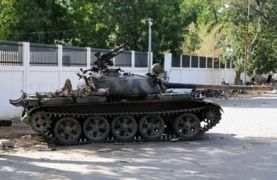Chad imposes curfew as rebels regroup
February 7, 2008 (NDJAMENA ) — Chad’s government on Thursday slapped a night curfew on Ndjamena and southern provinces as rebels who almost ousted President Idriss Deby Itno regrouped and rearmed after battling for the capital.
 Deby claims he controls the whole country, but a military source said the rebel alliance driven out of Ndjamena after a heavy weekend of fighting met up with reinforcements about 400 kilometres (250 miles) east of the city.
Deby claims he controls the whole country, but a military source said the rebel alliance driven out of Ndjamena after a heavy weekend of fighting met up with reinforcements about 400 kilometres (250 miles) east of the city.
The 6:30pm to 6:00am (1730 to 0500 GMT) curfew will apply in Ndjamena and six southern and eastern provinces “for the time it takes to uncover … enemies who are still hidden,” Prime Minister Delwa Kassire Coumakoye told a cabinet meeting.
The military source said at least 200 pick-up trucks had formed a new column near Mongo, while a rebel spokesman said the alliance now had fresh supplies of fuel and ammunition, raising fears of a further offensive.
The two days of fierce fighting in Ndjamena left at least 160 known and hundreds wounded, the Chadian Red Cross said. The city suffered serious damage in clashes involving tanks and military aircraft as well as combatants riding heavily armed vehicles.
While hundreds of Ndjamena refugees who fled across a river bridge to Kousseri in Cameroon were returning home Thursday after the government said it was safe, others queued to be registered and taken in hand by UN agencies.
Cameroon’s army and relief workers estimated that 50,000 people fled Chad, including 2,500 Cameroonian traders and students.
A World Food Programme worker in Kousseri reckoned that about 20,000 had gone home in three days, but 30,000 wanted to stay in Cameroon, unsure of the future.
Deby accuses Sudan’s government of backing the rebels operating out of bases in its western Darfur region, where Khartoum’s troops and local Arab militias have cracked down on a black minority rebellion.
The United Nations estimates 200,000 people have died in Darfur and two million have been displaced.
Speaking on French radio Europe 1, Deby accused the African Union of “burying its head in the sand” over the crisis, and warned this gave Sudan “a sort of green light to destabilise Chad”.
The Chad crisis has delayed the deployment of a European Union force in Chad and Central African Republic with a mandate to protect hundreds of thousands of refugees from Darfur and local people displaced by internal strife.
“It would have helped if EUFOR had already been deployed,” Deby said, adding that intelligence from a French unit permanently stationed in Chad had been “very important and useful for the actions we had to take.”
The rebels condemned France for a “heavy responsibility in siding with the dictatorial, repressive, corrupt, mafia-like and illegal regime and manipulating the (UN) Security Council to justify armed intervention”.
French Defence Minister Herve Morin visited Ndjamena on Wednesday.
After the rebels launched their offensive on January 28, France boosted its permanent force to 1,450 troops, and drafted a Security Council resolution — adopted Monday — opening the way to military action if requested.
French reconnaissance planes already monitor the desert and Sudanese border.
Rebel leaders Mahamat Nouri, Timane Erdimi and Adbelwahid Aboud Makaye joined forces in December after a peace pact with Deby collapsed.
“We only went to the east (out of the capital) for logistical reasons,” rebel spokesman Abderaman Loulamallah told AFP, adding that they had ammunition and fuel but without hinting at future plans.
EUFOR commanders want their mission of 3,700 troops to be fully up and running in May, with troops drawn from 14 nations, and France providing more than 2,000 personnel.
The deployment decision depends on EUFOR’s head, Irish General Pat Nash, in conjunction with his French military colleague General Jean-Philippe Ganascia, who is currently at a temporary command post at Ndjamena airport.
“We should again see soldiers and officers of the European general staff arrive at the start of next week,” Ganascia told AFP. The aim was now “initial operational capacity” by the end of March, he added.
“Negotiations are under way with certain countries to know which will be ready first and those that can immediately take part in force protection missions.”
In Vienna, Austrian Chancellor Alfred Gusenbauer — in a clear reference to France — said Thursday the European Union should reconsider EUFOR’s mandate “if one of the member countries of EUFOR takes an active part in fighting.”
(AFP)
